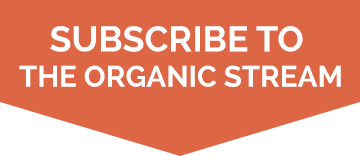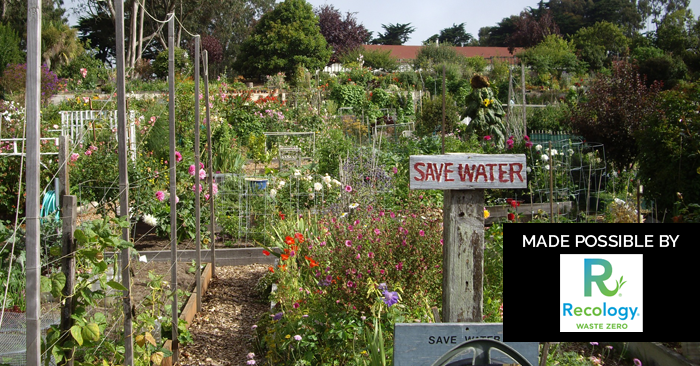EM: So Robert, I know that there’s a lot of talk about California right now, which is experiencing one of the worst droughts on record at the moment. The Governor declared it a state of emergency, and has signed a 687 million dollar drought-relief package into law. Farms are suffering, and people are being urged to reduce their water usage by up to 20%. So, it’s going to be a tough summer and people are doing all they can at the moment to help save water. What are you doing over at Recology to help the effort?
RR: Well, we’re trying to help people understand and know that compost saves water, and that by participating in our curbside compost collection program, people can help California save water. Compost by weight is fifty percent humus, and humus is a natural sponge. And farmers understand this, and they’ve purchased a whole lot of compost from us in the last six months, to put it on their farms in an effort to retain more rainwater.
And, at Recology we’re trying to help people understand the ability of compost to help capture and retain water. In the city, the traditional reasons to participate in the curbside compost collection program are to keep materials out of landfills, and return nutrients to farms. And almost everybody understands the first one; everybody gets that composting is a good thing to keep material out of landfills, and to have less landfilling going on.
I would estimate that about half of the people in San Francisco are connected and understand the second motivation, which is to return nutrients to farms. And now, we’re trying the emphasis a third reason to compost all of their food scraps, all of their plant cuttings, and this third reason is to help save water, and to help California – the state that we love – do better in terms of mitigating the drought.
EM: Yeah, excellent. And I presume getting people to understand that last one is a little more difficult, then?
RR: Well, for people in the city, it’s a new idea and so, when you have a new idea, you need to get it out there a lot, you know. You need to get it on the internet, you need to write about it, you need to do TV reports about it…you need to put it in your newsletter on your website…. It just helps of people hear it multiple times from different sources.
We’ve worked a lot with some agronomists to help get the wording right, get the research correct, so that we can frame the message correctly and accurately, and then help communicate this, about how compost helps save water. And we’ve written an article, and we’re going to publish it as the lead story in our customer newsletter next week. We also shot a photograph that shows some hands holding a little young plant – green with water on its leaves, and of course the compost in the picture is very wet, and very heavy with water. So we have an iconic image that helps people…they can look at it and they immediately understand this point, that compost and the humus in compost is a natural sponge. Pictures are very powerful, and so this image is important, and we want to present this image in as many places as possible – and the message.
Mh-hm, right. And as part of your outreach campaign, too, you host an annual compost giveaway in various locations around the city for people just to come and collect compost, is that right?
RR: Yes, and it’s absolutely a joyous community event and it’s a bring your own bucket event, so people will bring two five-gallon buckets, and we’ll fill them with compost that they helped make, and they take it home and put it on their gardens, and on their outdoor plants. And, you know, this is the kind of thing that you can do when your city has a compost collection program. You know, not only can you keep materials out of landfills; not only can you send nutrients back to farms; not only can you help the region and the state that you live in save water – but you can also help create a compost that then comes back to your city, that residents can get through a compost giveaway; they can use in their own gardens; and that can come back to community gardens in your community; and can come back to urban farms in your community.
EM: Yeah, exactly. But now I’d like to get down to business and talk a little bit more about campaign strategies – can you tell us what you think makes for successful awareness campaign and public outreach strategy?
RR: Well, you have to go straight to it and say, you know, “compost to help save water”. And people kind of subliminally understand these things; it’s a very old understanding for people. All of us have gotten our fingers into the soft soil in a garden at some point in our life. And so, when we present a picture that shows compost that’s heavy with water and it’s very dark, it rekindles this subliminal memory in people.
And so, it’s our feeling that people need to see this picture and hear this message. They need to see it in print, they need to see it online…one of the points here is that the outreach and education around composting and recycling is competing with a lot of other information that’s in your community, that’s on the news.
There’s just all kinds of information out there that’s competing for people’s attention. And so, composting has to be part of that discussion. Composting has to be part of the game, so how do you make all this good information; this positive information about composting…how do you get in the game?
EM: Mh-hm, right.
RR: And one of the things is what you mentioned, is that the leaders in the community need to be talking about it, and concerned about it. And they need to attend the compost giveaway; they need to talk to the media about it; they need to hold a news conference about it periodically, or pen an article or an op-ed that gets published in the city’s newspaper. So, you need to do creative things. And one of the things we just did at Recology is we came up with a playful recycling quiz, and we posted it on our website.
EM: Yeah, I saw that actually, I thought it was very funny.
RR: Yeah, well okay, I’m glad you enjoyed it. You know, we…it’s a series of nine multiple questions – what goes in the blue bin, what goes in the green bin. And of course the first answer is something completely ridiculous, and then the second option is something frustrating or annoying. And then of course the third answer is the correct answer, and it’s something you might not have known that you could compost – like soiled paper.
EM: Yeah, and I particularly like how you actually explained in your newsletter about the soiled paper – that it’s great for compost. And that you call the short paper fibers that organisms love to consume – y you called them carbon candy. I think that’s a great way of framing it.
RR: Yeah, and those are the kinds of stories that we need to tell, and we need to particularly tell them to younger people. The Union of Concerned Scientists did an analysis – they looked at all the message about recycling and about composting: should the outreach dollars be spent on radio ads, or TV ads, or bus shelters, you know. And they measured for the first time in the history of America; really, they did a very complete measurement of what is the most effective way to communicate about recycling and composting. And the answer…what they discovered was that the best thing to do was to communicate to students and to younger people.
They reported that we all know that kids learn to recycle at school and then go home and teach their parents. What this research proved was that parents are actually listening to the kids. So when the child goes home and says, “Mom, we compost at school, dad we compost at school – why don’t we compost here in our kitchen at home?” Then the parents are listening and the family will then get a kitchen compost pail and start composting more of their food scraps and their plants at home, and increase their participation in the composting program.
EM: That’s very interesting.
RR: Yeah, it’s very interesting. So, we’re trying to tell the story of carbon candy to kids. We’re making presentations every week to students in classrooms in San Francisco. One of the reasons, you know, that we did the playful recycle-compost quiz is to do something entertaining, and we’re going to let all the schools know about it. And that’s what we’re doing in California.
The farmers are joining us. The farmers have come to San Francisco and held news conferences, and asked people to be more attentive to put all their food scraps and plant cuttings – and soiled paper – in the green bins, so that we as a community can make more compost and we can get it onto farms, and add life to the soils – return life to the soils to help protect our topsoils. This is very interesting: farmers coming into the city, holding news conferences; asking people in the city to do right by the environment, to compost more of their food scraps.
EM: Very good. And for the last question, now, I’d just like to get your thoughts on the drought and how it looks for the future of California?
RR: Well, there’s many articles that are suggesting that California will not have as much rainfall in the future as it has historically. So, we have a history of dealing with dry periods; we’re going to have to remember what has worked for us historically. And, if you want to know the answers to environmental questions; what should we do to help protect the environment, what can we do to do more recycling, more composting…often the answers are in the history.
Look back: what did your grandparents do? What did your great-great grandparents do? They composted! Okay. They had an area where they would put their food scraps – they made compost. And we need to remember that as a community, and we need to do more of that. And we’re going to need to do more of that in the future.
EM: Wise words. But unfortunately that’s all we have time for now today, Robert.
RR: Alright.
EM: Thanks for coming on the show.
RR: Thank you.
EM: Alright, best of luck now.


